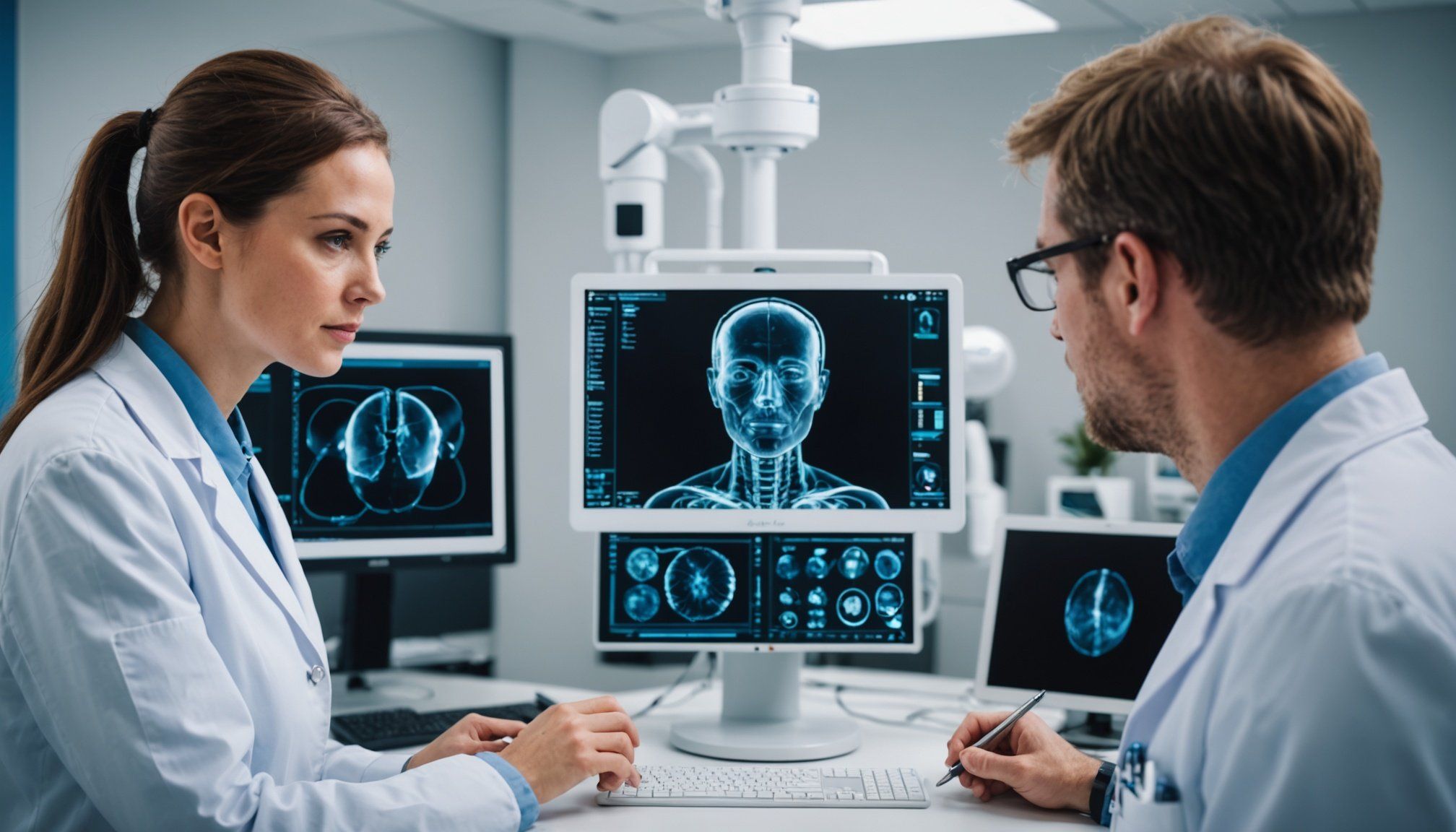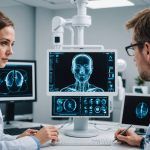Introduction to AI in UK Healthcare Diagnostics
Healthcare systems across the UK are increasingly embracing AI integration to enhance the diagnostic landscape. By automating routine tasks and analysing complex datasets, AI significantly improves diagnostic accuracy and speed. This boon is particularly valuable in a sector where timely and precise diagnosis is critical for optimal patient outcomes.
Importance of Diagnostics
The role of diagnostics in healthcare cannot be overstated. Accurate diagnostics allow for early intervention, drastically improving patient prognosis. AI technologies facilitate this by supporting clinicians in identifying diseases earlier and more accurately through advanced data analysis capabilities. This trend is pivotal in transforming the UK’s healthcare approach, making it more proactive rather than reactive.
Topic to read : Unleashing the Power of Storytelling: How Artisanal Food Producers in the UK Create Unique Brand Narratives
Current Landscape of AI in UK Healthcare
The present landscape shows a promising stride towards the widespread adoption of AI technologies. From machine learning algorithms assessing medical images to data analytics predicting patient outcomes, AI is becoming a cornerstone of UK healthcare. Institutions are realising AI’s potential in reducing workload and enhancing precision, making rigorous investments in these technologies. As AI integration in healthcare advances, it’s evident that the UK’s medical diagnostics field is on the brink of a significant transformation, with AI at its core.
AI Technologies Relevant to Diagnostics
In recent years, AI technologies have become increasingly integral to the field of diagnostics, enhancing the precision and speed of medical evaluations. These technologies utilise complex algorithms to process vast amounts of data with exceptional accuracy. One of the most valuable applications is machine learning which powers various diagnostic tools and systems.
This might interest you : Proven Strategies Every UK Financial Advisor Should Use to Steer Client Portfolios Through a Bear Market
Machine Learning Algorithms
Machine learning algorithms play a critical role in diagnostics by allowing computers to learn from historical data. They excel in identifying patterns that may elude human specialists. For instance, in detecting abnormalities in medical images, machine learning systems analyse nuances to predict possible disease outcomes. This provides medical professionals with valuable insights, significantly reducing diagnostic errors.
Natural Language Processing
Natural Language Processing (NLP) is another vital AI technology that simplifies the analysis of unstructured text from patient records. By interpreting doctor notes, lab results, and other textual data, NLP improves data utilisation, aiding swift and thorough diagnostics, thereby supporting clinicians in making more informed decisions.
Image Recognition Tools
Image recognition tools underpinned by AI are transformative, especially in radiology. These tools assist by interpreting complex medical images with high precision, highlighting potential areas of concern. This technology exponentially improves detection rates in various healthcare settings, fostering better patient outcomes.
Case Studies of Successful AI Integration
In the dynamic world of UK healthcare, numerous case studies highlight the successful integration of AI. These examples illustrate the potential of AI in transforming traditional medical practices.
Several UK healthcare providers have pioneered the use of AI, setting benchmarks for diagnostic excellence. One notable example is the Royal Free London NHS Foundation Trust. They employed AI algorithms to assist in early kidney disease detection. This initiative has significantly improved diagnostic accuracy, addressing the need for timely intervention, thereby enhancing patient outcomes.
Another exemplary case is Moorfields Eye Hospital, which utilised AI-driven image recognition to diagnose eye conditions. These successful AI applications aid in swift, precise diagnoses, providing clinicians with robust decision-making tools.
Through these case studies, important lessons have emerged. Firstly, clear strategic planning is vital for AI integration. Secondly, a well-defined collaboration framework between technology providers and healthcare institutions enhances implementation efficacy. Lastly, continuous evaluation of AI systems ensures long-term success and sustainability. Thus, the experiences of these providers reveal invaluable insights that can guide future AI integration in healthcare, ensuring smarter, efficient patient care solutions.
Best Practices for Implementation
Implementing AI integration in healthcare requires strategic planning and consideration of several vital elements to ensure successful adoption. A key cornerstone is staff training and education. Educating healthcare professionals on AI tools is crucial for effective utilisation. Training programs should focus on developing skills to interpret AI outputs and incorporate them into clinical decision-making effectively.
Patient engagement is another challenging yet essential aspect. Including patients in the AI diagnostic process fosters trust and improves transparency. Encouraging dialogue about AI’s role in care and addressing patient concerns can greatly enhance effectiveness. Patients who understand AI’s benefits are more likely to embrace technological involvement in their health management.
Moreover, the integration with existing systems presents its complexities. Many healthcare institutions struggle with aligning new AI solutions with outdated infrastructures. Ensuring compatibility and seamless operation necessitates substantial investment in infrastructure upgrades and the establishment of robust support systems. This can mitigate disruptions and ensure continuous service excellence.
For successful AI implementation in UK diagnostics, it is imperative to consider these best practices. By following these, healthcare providers can significantly enhance the effectiveness and acceptance of AI technologies, leading to improved patient outcomes and more efficient healthcare delivery.
Potential Challenges and Barriers
AI Integration in healthcare, especially within UK diagnostics, faces numerous challenges. The most prominent issue is data privacy and security. As AI systems rely heavily on patient data, protecting this sensitive information from breaches is paramount. Ensuring robust cybersecurity protocols is complex but necessary for maintaining patient trust.
Technological limitations pose another significant concern. Despite advancements, AI systems can sometimes produce unreliable results due to their dependence on large data sets that may not account for individual patient variability. Continuous refinement and testing of AI algorithms are essential to mitigate these reliability issues.
Moreover, there exists a natural resistance to change among healthcare professionals. The adoption of AI technology requires shifts in traditional diagnostic practices and workflows, which can be met with scepticism. Strategies such as continued professional development focusing on the benefits of AI might ease this transition.
Lastly, the integration process is hindered by potential risks involved in implementation. These risks include misinterpretation of AI outputs and over-reliance on technology without human oversight. Addressing these barriers requires a collaborative approach, combining technical innovation with education and regulatory support to ensure smooth AI adoption in healthcare diagnostics.
Regulatory and Ethical Considerations
In the realm of AI diagnostics, navigating the regulatory framework is critical for ensuring compliance and fostering trust. Current regulations in the UK mandate stringent adherence to data protection laws, such as the GDPR, ensuring patient data confidentiality and security. These regulations serve as a pillar, safeguarding individuals while allowing AI tech to flourish responsibly in healthcare.
When discussing the ethical implications, AI’s ability to process sensitive patient data invites scrutiny. Ethical considerations focus on maintaining patient anonymity and addressing algorithm biases that might skew results. Ensuring AI systems are transparent and explainable is key, so both clinicians and patients can trust the decision-making processes.
Looking towards the future, legislative developments anticipate a wave of changes aligning with technological advancements. These adjustments aim to fortify ethical standards, promote transparency, and refine accountability measures for AI solutions in diagnostics. For sustainable progression, upcoming regulations should balance innovation with public trust, encouraging an environment where AI can continue to enhance healthcare while respecting patient rights and professional standards.
Healthcare stakeholders must remain vigilant, adapting to these evolving frameworks to ensure the ethically sound deployment of AI technologies that prioritise patient care and safety.
Future Trends in AI Diagnostics
The UK is on the cusp of a significant transformation in healthcare, driven by future trends in AI diagnostics. One pivotal advancement is the rise of predictive analytics, allowing forecasts about patient health trajectories. By leveraging vast datasets, healthcare providers can predict disease progression, anticipate treatment responses, and identify at-risk patient populations with heightened accuracy. This empowers clinicians to make proactive, informed decisions tailored to individual needs.
The shift towards personalized medicine is another key trend, enabled by AI’s ability to process complex genetic and multi-omic data. This leads to bespoke diagnostics and treatment plans that match a patient’s unique genetic makeup and lifestyle factors. Consequently, personalized medicine minimizes trial-and-error in treatments, enhances efficacy, and reduces adverse effects.
As AI technologies evolve, the implications for patient care are profound. The integration of predictive analytics and personalized medicine signifies a move towards more data-driven, patient-centered care models. The potential for AI to enhance disease prevention and management is vast, promising improved patient outcomes and more efficient resource allocation. The ongoing advancements herald a healthcare system more attuned to the intricate demands of individual patient journeys.











